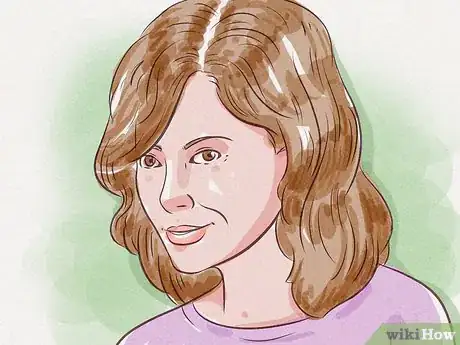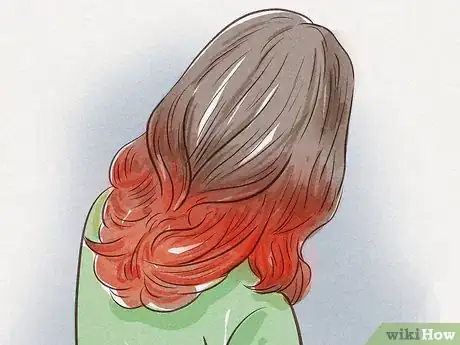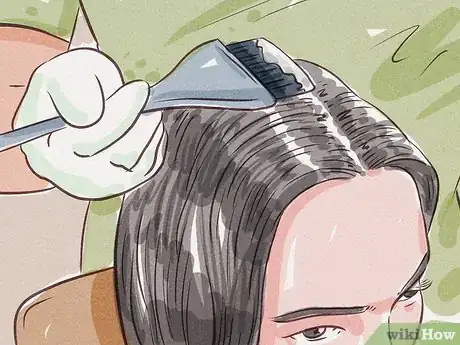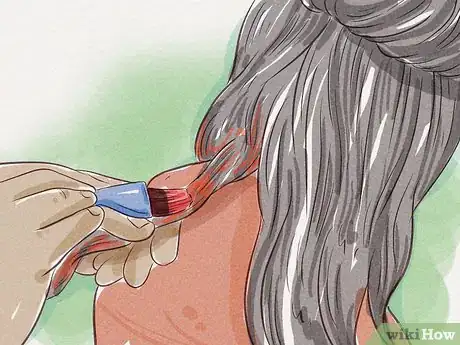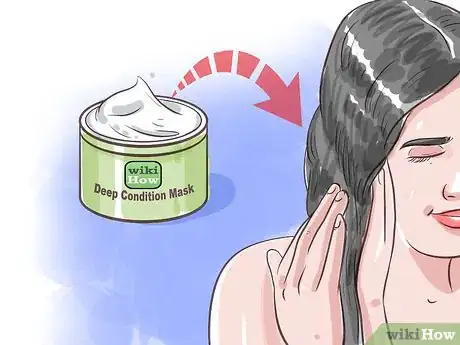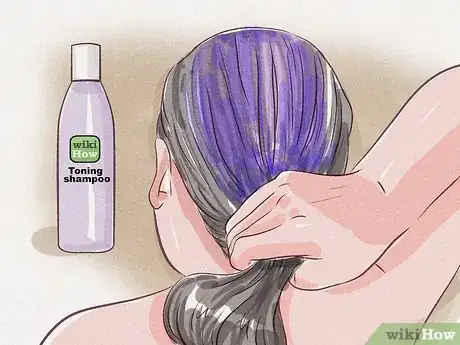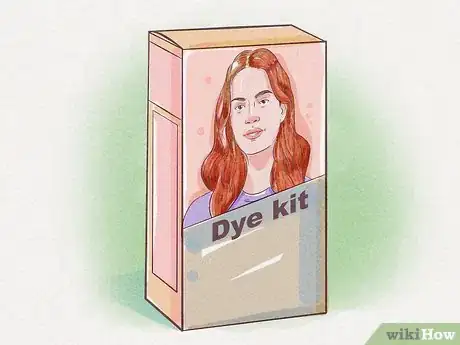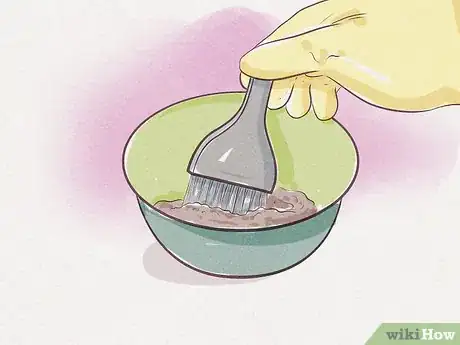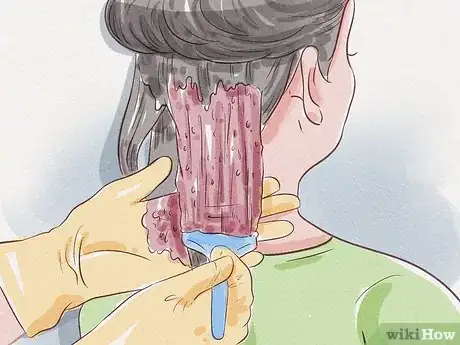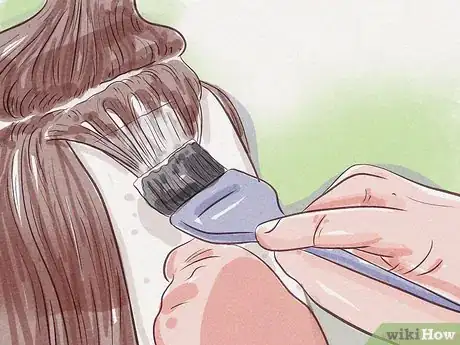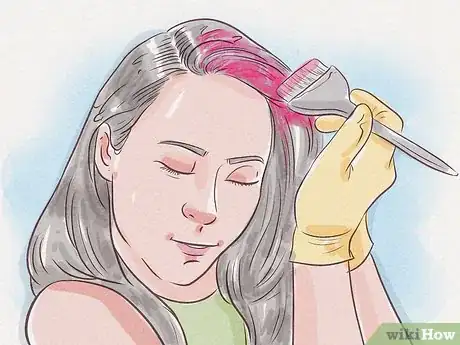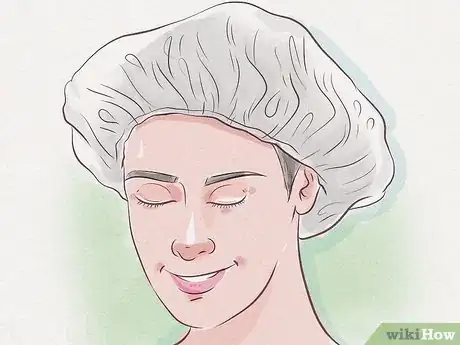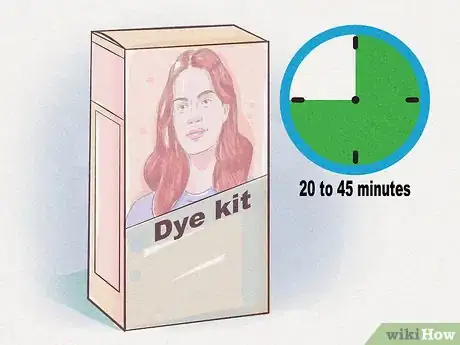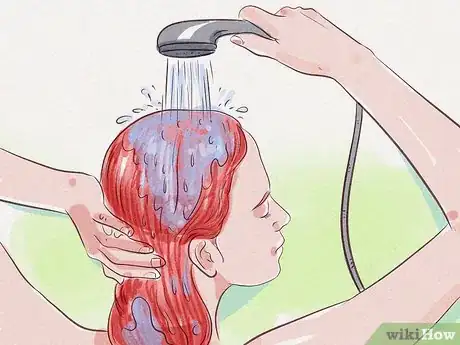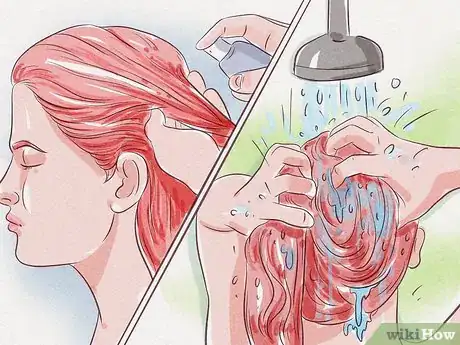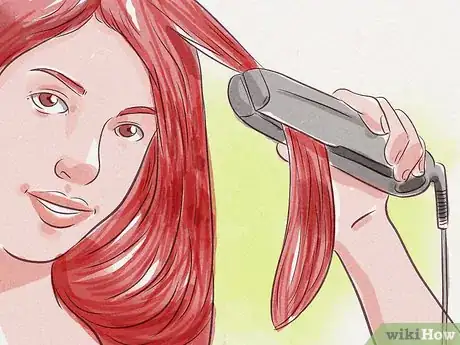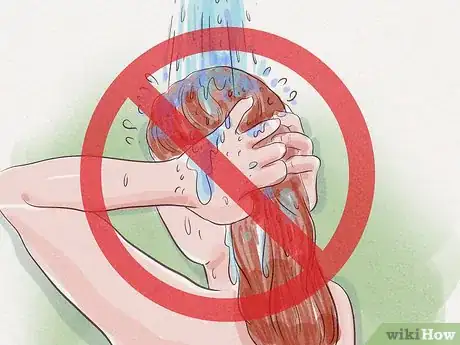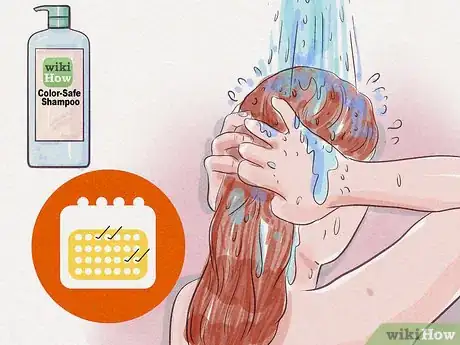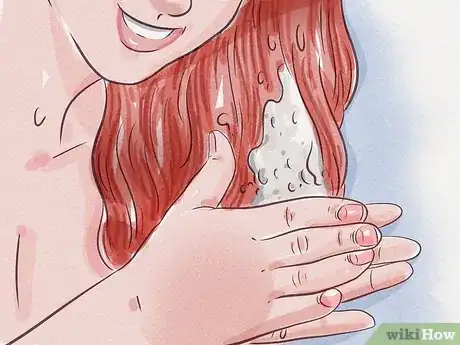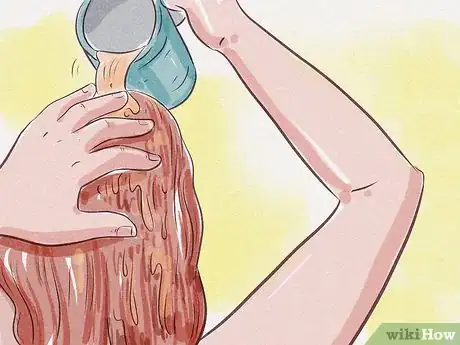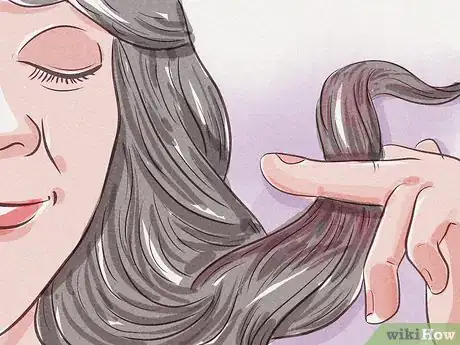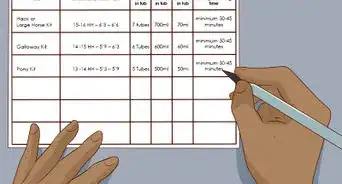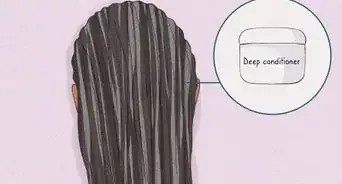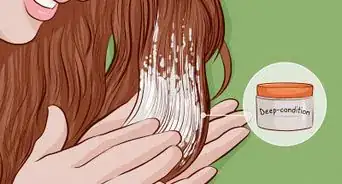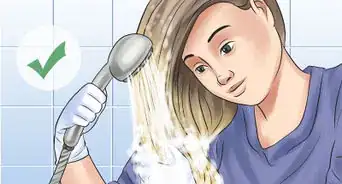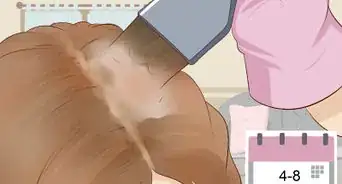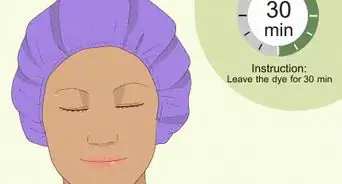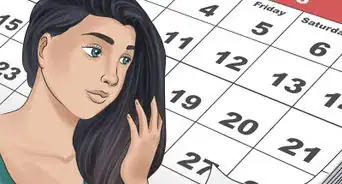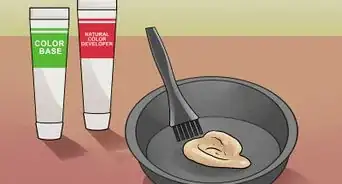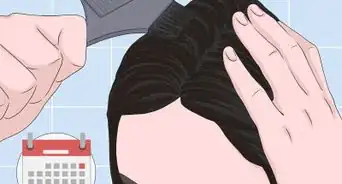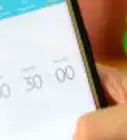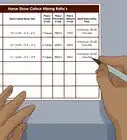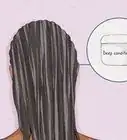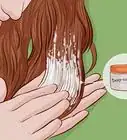This article was co-authored by Christine George. Christine George is a Master Hairstylist, Colorist, and Owner of Luxe Parlour, a premier boutique salon based in the Los Angeles, California area. Christine has over 23 years of hair styling and coloring experience. She specializes in customized haircuts, premium color services, balayage expertise, classic highlights, and color correction. She received her cosmetology degree from the Newberry School of Beauty.
There are 8 references cited in this article, which can be found at the bottom of the page.
This article has been viewed 48,340 times.
Red hair is trendy and fashionable. It is also as rare as it is beautiful. Luckily, it is possible to dye your hair red, even if you have dark hair. Knowing how to prepare your hair for dyeing is just as important as the process itself. Taking proper care of your dyed hair is also important. Not only will it keep your hair healthy, but it will help the color last longer.
Steps
Preparing to Dye Your Hair
-
1Choose a red hair dye that goes well with your skin's undertone. Hair comes in warm and cool undertones, just like skin does. Choose a shade that is opposite of your skin undertone. For example, if you have warm skin with yellow undertones, choose a cool shade of red with purple undertones. If you have cool skin with pink undertones, go for a warm shade of red with copper undertones.[1]
-
2Choose a shade of red that matches your skin tone. Unlike undertone, skin tone refers to how light or dark your skin is. In general, the lighter your skin is, the lighter red you should aim for; the darker your skin is, the darker red you should go for. For example:
- If you have fair skin, opt for a bright copper or strawberry blond. Avoid wine and burgundy shades, unless you want a pale or gothic look.
- If you have a medium skin tone, choose a medium shade of red, such as copper or auburn. Avoid purple tints, as they can make your skin appear sallow.
- If you have dark skin, try a medium shade of auburn or a brownish shade. Avoid cool reds that have too much blue in them, however, as they can make your skin appear greenish.[2] Instead, go for a warm red that has some orange in it.
Advertisement -
3Match the red to your natural shade if you wish to avoid bleaching. Red hair can range from light to dark, just like brown and blonde hair. For example, if you have medium-brown hair, then look for a medium shade of red. This way, you won't have to bleach your hair. [3]
- If you have black or very dark brown hair, you may have to bleach your hair to some extent to achieve the true red color. If you're using a boxed dye, the color will process as long as it's mixed with the developer that is included in the kit. However, if you have black or dark brown hair, the red may not come out as vividly as you’d like.
-
4Determine whether you need to bleach your hair. Depending on how dark your hair is and how light you want the final color to be, you may have to bleach your hair first. In most cases, people with dark brown or black hair will need to bleach their hair in order for the dye to show up.[4]
- If your hair is lighter than the color you will be dyeing it, you do not need to bleach it first.
- If your hair is 1 to 2 shades darker, you can skip the bleaching, but be aware that the color will come out darker than what's on the box.
- If your hair is 3 or more shades darker, you should bleach it.
-
5Bleach your hair to the same lightness as your desired red. Red hair comes in light, medium, and dark shades, just like brown and blond hair. You will need to bleach your hair to the closest blond or brown shade. For example, if you have black hair and want to go auburn, you should bleach your hair to a medium-brown shade.[5]
- Make sure that your hair is dry and healthy. Apply the bleach to the ends first, not the roots.
- Use the recommended developing time as a guide. Check your hair every 10 minutes in case it processes faster.
- Never leave bleach in your hair longer than the recommended time.
-
6Do a second bleach session if your hair is not light enough. Wait at least 1 full day before attempting to bleach your hair again. If your hair feels dry, it would be better if you waited until the following week so that it can recover from the harsh bleaching process. Alternatively, you can settle for a darker shade of red instead. It will still look great and your hair won't get as damaged.[6]
- Apply a deep conditioning mask between bleaching sections to help your hair recover.
-
7Tone your hair if you are dyeing it a cool red. Bleaching tends to make your hair yellow or orange. While this is fine for warm reds, it can make cool reds appear less vibrant. Purchase a bottle of purple or blue toning shampoo from a salon or beauty supply store, then use it according to the instructions on the back.[7]
- Just because shampoo looks purple or blue does not mean that it is a toning shampoo. It must say "toning" on the bottle.
- Examples of cool reds include: garnet, mahogany, burgundy, claret, and rosewood blonde.[8]
Applying the Red Dye
-
1Purchase your dye from a beauty supply store. You can use a professional dye or a boxed dye kit. If you choose to use a professional dye, you will need to get a 10 volume developer as well as a pair of plastic dyeing gloves. If you choose to go with boxed dye, you are all set; the box will have everything you need inside.[9]
- If you have long, thick hair, a single boxed dye kit may not be enough. Purchase 2 kits, just in case.
-
2Mix your dye in a non-metal bowl. Pour the cream developer into a glass or plastic bowl. Add the dye, then stir it in using a plastic spoon or the handle of your tinting brush. Keep stirring until the color is consistent and no streaks remain.[10]
- How much dye you prepare depends on how long and thick your hair is. Make enough to completely saturate your hair.
- You can prepare boxed dye using the bottle provided, but it would be better to prepare it in a bowl, like professional dye.
-
3Divide your dry, unwashed hair into quarters. Use the handle of a rat-tail comb to part your hair down the center, from forehead to nape. Drape each section of hair over your shoulders so that the back doesn’t get mixed up. Next, part your hair horizontally, from ear-to-ear. Twist and clip the top 2 sections out of the way, then twist and clip the bottom 2 sections.[11]
-
4Protect your clothing, skin, and counter. Put on an old shirt, or drape an old towel around your shoulders. Apply petroleum jelly to your hairline, ears, and back of neck. Pull on a pair of plastic dyeing gloves, then cover the counter with newspaper or plastic bags to guard it against stains.
-
5Apply the dye to the first section, starting from the roots. Choose a section to start with, then unclip it. Comb the section out, then apply the dye to it using a tinting brush. Massage the dye into your hair using your gloved fingers. Start from the roots and work your way down to the ends.[12]
- If you have thick hair, you may need to divide the section that you are working on into smaller sections first. Try separating the section into smaller sections that are about 1 inch (2.5 cm) to ensure that your hair is fully saturated in the dye.
- If you chose to mix the boxed dye in the provided bottle, apply it to your hair straight from the bottle. Work it into your hair with your fingers.
-
6Twist and clip the finished section, then move onto the next. Continue in this fashion until all 4 sections are complete. Make sure that you get the fine hairs at your forehead, temples, and the nape of your neck as well.
Finishing the Dye Job
-
1Cover your hair with a plastic shower cap. This will help keep your surroundings clean. It will also trap the heat generated by your head and help the dye process faster. You can use this time to wipe off any dye on your skin using a cotton ball and an alcohol-based makeup remover.
-
2Allow the dye to develop for the time recommended on the package. How long you end up waiting depends on the type of dye you are using, so read the instructions carefully. Most boxed dye kits require you to wait 20 to 25 minutes. Professional dyes typically have a 20- to 45-minute developing time. Don't go over the recommended time, or you risk damaging your hair.[13]
-
3Rinse the dye from your hair using cool water. Once the time is up, remove the shower cap and clips. Rinse the dye out in the sink or shower using cool water. Do not use any shampoo, or you will risk rinsing the dye out.
- If the water is too cold for you, you can turn it up to a lukewarm temperature instead.
-
4Apply a color-safe conditioner to your hair, then rinse it out. Use the conditioner that came in your dye kit. Apply the conditioner to your hair, wait 2 to 3 minutes, then rinse the conditioner out. Be sure to use cool to lukewarm water for this.
- If your kit did not come with a conditioner, purchase a silicone-free, color-safe conditioner from the store, and use that instead.
-
5Dry and style your hair as desired. It would be best to allow your hair to air dry, but you can blow dry it as well. Avoid heat-styling it for the next couple of days so that it can recover from the dyeing (and bleaching) process. If you must use a curling iron or flat iron, apply a heat protectant to your hair first, and use a low-heat setting.
Maintaining Your Hair Color
-
1Don't wash your hair for at least 3 days. This may sound gross, but if you wash your hair too soon after dyeing, the red may fade partially or completely from your hair. Wait at least 3 days before washing your hair again. If your hair starts to feel greasy, you can use dry shampoo on it. The dry shampoo will not cause the color to fade.[14]
- After those 3 days are up, you can wash your hair again. Limit your hair washing to no more than twice per week to help preserve its color.[15]
-
2Wash your hair twice weekly using cold water and color-safe shampoo. Never use hot water on your hair, or the dye will come out. Use the coldest temperature you can handle, even if it is just lukewarm. If possible, use a shampoo and conditioner specially formulated for color-treated hair.[16] If you can't find any, use something that is sulfate-free instead.[17]
- Most shampoos and conditioners will state on the bottle if they are sulfate-free. If they don't say "sulfate-free," they probably contain sulfates.
- Check the ingredient label. Avoid anything that contains the word "sulfate" in it, such as "sodium lauryl sulfate" or "sodium laureth sulfate."
-
3Apply a deep conditioner once per week, especially if you bleached it. Dyeing is a harsh process for your hair, even more so if you bleached it first. If you hair feels wiry or dry, apply a sulfate-free or color-safe deep conditioner to it. Leave the deep conditioner on for the time recommended on the bottle (typically around 5 minutes). Then, use cool water to rinse out the conditioner, as this will seal the cuticle and lock in the moisture.
-
4Rinse your hair with vinegar-water to help preserve the color. Mix 1 gallon (3.8 L) of cold water with a cap-full of apple cider vinegar. Tilt your head back, and pour the vinegar-water over your hair. This will help seal the cuticle and make the dye last longer. It will also help make your hair shinier![18]
- Do not get the vinegar-water in your eyes. It will sting.
- Don't worry about the smell. It will go away once your hair dries.
- If you have oily hair, you can do the rinse once or twice a week. If you have dry hair, limit yourself to once or twice a month.[19]
-
5Limit the heat styling. Curling, straightening, and even blow drying your hair too often will cause the red dye to fade faster. Allow your hair to air dry when possible, and embrace its natural texture.[20] If you must heat style your hair, apply a heat protectant to it first. Use a lower heat setting on your hairdryer, curling iron, or straightener whenever possible.[21]
-
6Plan to retouch your hair color every 4 to 8 weeks. All hair dye fades, but red dye tends to fade faster due to the pigments. Plan on touching up your hair every 4 to 8 weeks, or whenever you notice your roots showing and the color fading.[22]
- Consider applying a gloss (diluted hair dye) in between dyeing sessions. This will help the color remain vibrant a bit longer.
Things You’ll Need
- Bleach and developer (if needed)
- Hair dye and 10 volume developer (or boxed kit)
- plastic dyeing gloves
- Old shirt or towel
- Rat-tail comb
- Large hair clips
- Plastic shower cap
- Glass or plastic mixing bowl
- Tinting brush
- Color-safe conditioner
References
- ↑ http://www.byrdie.com/best-hair-color-for-skin-tone
- ↑ http://www.youbeauty.com/beauty/red-hair-color-skintone/
- ↑ https://bellatory.com/hair/How-to-dye-hair-red
- ↑ https://bellatory.com/hair/How-to-dye-hair-red
- ↑ https://bellatory.com/hair/How-to-dye-hair-red
- ↑ https://bellatory.com/hair/How-to-dye-hair-red
- ↑ https://www.naturallycurly.com/curlreading/hair_color/this-is-why-bleached-hair-turns-orange-and-how-to-stop-it-bi/
- ↑ https://bellatory.com/hair/How-to-dye-hair-red
- ↑ https://bellatory.com/hair/How-to-dye-hair-red
- ↑ https://bellatory.com/hair/How-to-dye-hair-red
- ↑ https://bellatory.com/hair/How-to-dye-hair-red
- ↑ https://bellatory.com/hair/How-to-dye-hair-red
- ↑ https://bellatory.com/hair/How-to-dye-hair-red
- ↑ https://www.teenvogue.com/story/red-hair-dye-tips-and-tricks
- ↑ http://www.marieclaire.com/beauty/a4445/best-red-hair-color/
- ↑ Christine George. Master Hair Stylist & Colorist. Expert Interview. 10 January 2020.
- ↑ https://www.teenvogue.com/story/red-hair-dye-tips-and-tricks
- ↑ https://www.teenvogue.com/story/red-hair-dye-tips-and-tricks
- ↑ http://coconutsandkettlebells.com/apple-cider-vinegar-hair-rinse/
- ↑ Christine George. Master Hair Stylist & Colorist. Expert Interview. 10 January 2020.
- ↑ https://www.teenvogue.com/story/red-hair-dye-tips-and-tricks
- ↑ https://www.teenvogue.com/story/red-hair-dye-tips-and-tricks
